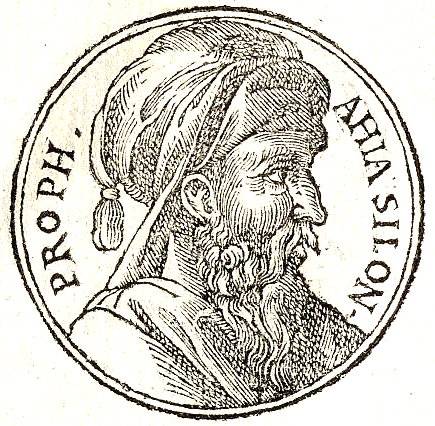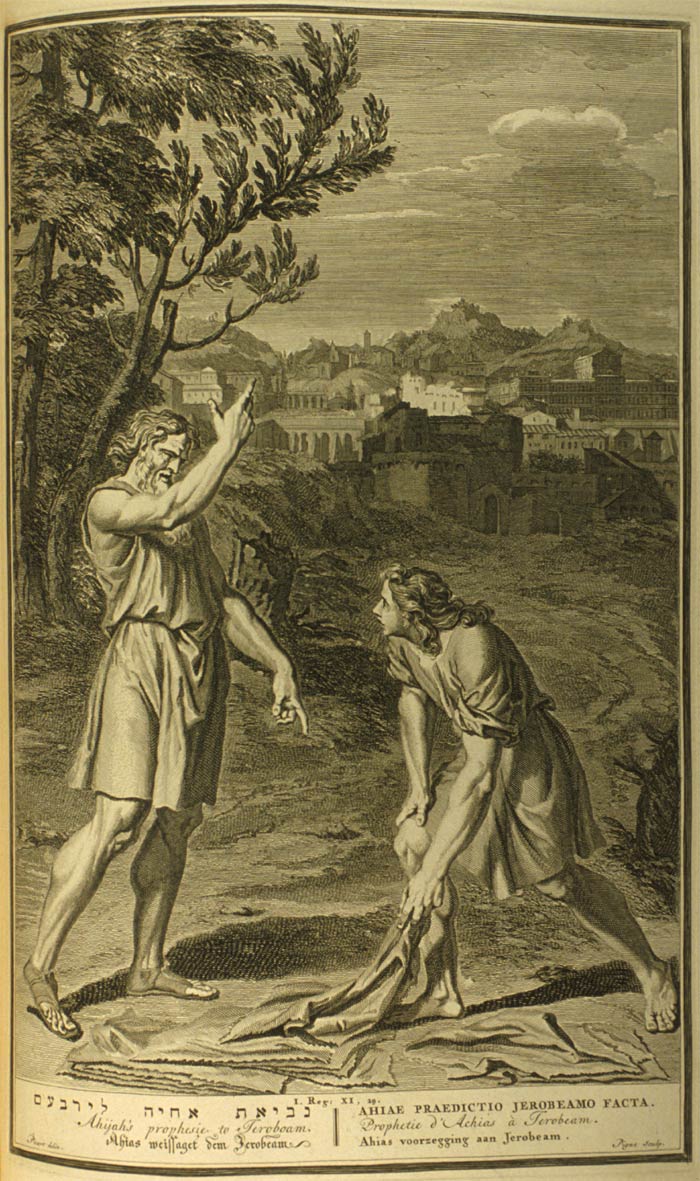1. Overview

Ahijah the Shilonite (אֲחִיָּה הַשִּׁילֹנִיʾĂḥīyyā hašŠīlōniHebrew; AchiasLatin) was a significant Levite prophet from Shiloh in the Hebrew Bible. He was active during the reigns of King Solomon and Jeroboam I, playing a crucial role in the prophetic narrative surrounding the division of the United Kingdom of Israel. His name is interpreted as "friend of Jehovah" or "Yah is my brother." Beyond his biblical accounts, Ahijah is extensively discussed in Rabbinic literature, which attributes to him an exceptionally long life and a profound influence on the transmission of spiritual wisdom.
2. Biblical Role
Ahijah's prophetic mission, as recorded in the First Books of Kings and Second Book of Chronicles, centered on his pronouncements concerning the Israelite monarchy, particularly the foretelling of its division and the rise and fall of Jeroboam's dynasty.
2.1. Prophecies and Activities
Ahijah's identity as a Levite prophet from Shiloh is central to his role. He delivered two major prophecies recorded in the Hebrew Bible. His initial prophecy to Jeroboam foretold that Jeroboam would become king. He announced the separation of the northern ten tribes from King Solomon's United Kingdom of Israel, leading to the formation of the Northern Kingdom.
Later, Ahijah delivered a prophecy to Jeroboam's wife, who had come to him disguised to inquire about their sick son, Abijah. Ahijah, though his eyesight was failing due to old age, recognized her and foretold the death of their son, the complete destruction of the House of Jeroboam, and the eventual fall and captivity of Israel "beyond the River." This phrase refers to the land east of the Euphrates River. Abijah died as Ahijah had prophesied.
2.2. Symbolic Act

A key element of Ahijah's prophecy regarding the kingdom's division was a powerful symbolic act. As recorded in the biblical narrative, Ahijah met Jeroboam outside Jerusalem and tore his own new garment into twelve pieces. He then gave ten of these pieces to Jeroboam, signifying that God would tear the kingdom from King Solomon's hand and give ten tribes to Jeroboam to rule. This act visually represented the impending fragmentation of the united monarchy and the establishment of a new kingdom under Jeroboam, with only two tribes remaining loyal to the Davidic dynasty.
3. Writings
According to the Second Book of Chronicles, Ahijah is credited with authoring a book titled the "Prophecy of Ahijah the Shilonite." This text is said to have contained detailed information about King Solomon's reign. In the First Book of Kings, it is referred to as the "Acts of Solomon." However, this book is considered one of the non-canonical books referenced in the Bible and has not survived to the present day, thus being lost to history.
4. Rabbinic Tradition and Interpretation
Jewish Rabbinic tradition offers extensive interpretations and elaborations on Ahijah's life and significance, expanding upon his biblical account. These traditions often connect him to other pivotal figures and provide theological explanations for his actions and prophecies.
4.1. Longevity and Connections
Rabbinic literature attributes an exceptionally long lifespan to Ahijah, linking his age to that of antediluvian patriarchs such as Adam and Methuselah. He is traditionally regarded as one of seven long-lived saints who, throughout human history, successively transmitted sacred lore from their predecessors to their successors. These figures are believed to have shielded their generations through their piety. The list of these saints includes Adam, Methuselah, Shem, Jacob, Serah (the daughter of Asher) or Amram (the father of Moses), Ahijah of Shiloh, and Elijah the prophet, who is believed to live until the coming of the Messiah.
According to this tradition, Ahijah lived for over 600 years, having received his "wisdom" from either Amram or Serah. If his wisdom was transmitted through Serah, his age would be considerably less, as she was believed to have lived for more than 400 years, extending into the days of King David. The rationale behind Ahijah being regarded as having attained such an unusual age stems from the belief that he authored the history of King Solomon's reign. Furthermore, he is identified with Ahijah the Levite, whom King David appointed to oversee the treasures of the house of God and dedicated items.
4.2. Rabbinic Interpretations
The Midrash, noting Ahijah's advanced age and the absence of a detailed lineage in the biblical narrative, identifies him with Ahiah, the oracle-giving priest at Shiloh during King Saul's time. The sage Simon ben Yoḥai is recorded as stating, "The world must have thirty righteous men to serve as its pillars. I and my son are counted among these... and if Abraham would carry the past generations by his merit, I will carry the future generations until the advent of the Messiah. And if Abraham would not, I would count Ahijah of Shiloh with me, and we together would carry the world by our merits."
Rabbinic tradition also offers an explanation for why Ahijah, despite being considered one of the pillars of righteousness, was sent with a divine message that ultimately led Jeroboam to establish an idolatrous kingdom. It is suggested that Ahijah was entrapped by a ruse orchestrated by Jeroboam's idolatrous associates. These individuals circulated a document requesting Jeroboam to become king, with a stipulation that if he were elected, he would set up golden calves at Dan and Beth-El. Ahijah, firmly believing that Jeroboam would not betray his trust, signed this document. Jeroboam had previously demonstrated great wisdom and learning, appearing to Ahijah "as pure as the new garment" he wore when Ahijah first saw him coming out of Jerusalem. Moreover, Jeroboam excelled all other pupils and had been initiated by Ahijah into the innermost secrets of the Law.
However, the rabbis interpret the biblical phrase "Ahijah could not see, for his eyes were set by reason of his age" as implying a spiritual blindness on Ahijah's part. This spiritual failing stemmed from his favoring a "wicked pupil" like Jeroboam and inadvertently contributing to his rise as a ruler who led Israel into idolatry. Consequently, some traditions suggest that Ahijah was afflicted with a plague as a result of this error.
5. Maimonides' View
Maimonides, in his introduction to "Yad ha-ḤazaḲah", provides a distinct account of Ahijah's lineage and connections. He describes Ahijah as a Levite and a direct disciple of Moses. Maimonides notes that Ahijah was among those who departed from Egypt, emphasizing that the tribe of Levi was exempt from the divine decree of death in the wilderness. Furthermore, Maimonides states that Ahijah was a disciple of King David; however, later commentators like Abraham ben David of Posquières have clarified that Ahijah was more accurately a member of David's court of justice. Significantly, Maimonides records that Ahijah became the teacher of Elijah the prophet before Elijah's ascension.
6. Significance and Legacy
Ahijah the Shilonite holds a profound and lasting impact on Israelite history, religious thought, and Jewish tradition. His prophecies directly led to the political and religious schism of the United Kingdom of Israel, fundamentally altering the course of the nation. The division into the Kingdom of Judah and the Northern Kingdom had immense consequences, shaping subsequent biblical narratives and the destinies of both kingdoms.
His pronouncements against Jeroboam's idolatry and the foretelling of the destruction of his dynasty underscored the prophetic emphasis on divine judgment against unrighteous rule. Beyond his direct biblical actions, Ahijah's enduring status as a prophetic figure is solidified in Rabbinic tradition, where his exceptional longevity and role in transmitting sacred wisdom highlight his perceived importance in maintaining spiritual continuity throughout generations. His life and prophecies serve as a testament to the power of divine revelation and its direct influence on historical events and the moral trajectory of leaders.